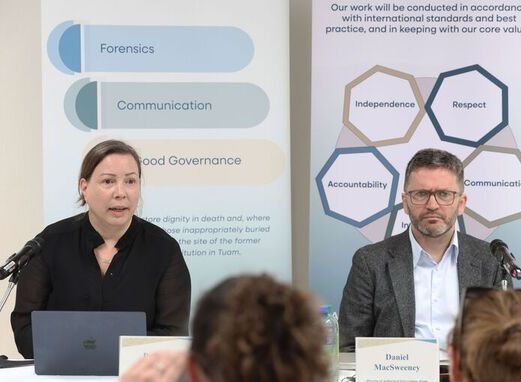Author Eileen McNamara worked for almost 30 years for the Boston Globe during which time she won the Pulitzer Prize for Commentary. Her latest book is "Eunice: The Kennedy Who Changed the World." PHOTO BY ROGER PELISSIER
Page Turner / Edited by Peter McDermott
If there is to be a historic before-and-after moment with regard to the issue of people with intellectual disabilities then it should be the Saturday Evening Post article in the fall of 1962 bylined by the American president’s sister, Eunice Kennedy Shriver. In it she revealed that the first-born of their family’s five sisters, Rosemary, suffered from mental retardation. The 4,500-word piece had in fact been written at her direction by New York Post staffer David Gelman, who was on leave working as a consultant to her husband Sargent Shriver, the founding director of the Peace Corps.
Biographer Eileen McNamara said Eunice Shriver had invited the magazine’s photographers “to capture images of laughing children in pony carts, on rope swings, in the swimming pool of her backyard.”
She learned well from the father she adored and considered a genius, and who in his turn had underestimated her. “Social acceptance, of a Catholic president or of a retarded child, first required a change in public perception,” writes McNamara in “Eunice: The Kennedy Who Changed the World.”
The journalist Gelman remembered her as “imperious and demanding” and the summer of 1962 as the most stressful of his life. One issue was that Eunice Shriver wanted to sound like President Kennedy in the piece. “The problem was, she wasn’t her brother,” Gelman said.
But her biographer suggests they were very alike in important ways: both suffered with life-long health problems (although Eunice tended when fit to prevail over any other Kennedy in sporting competition), and both in childhood were paired with and overshadowed by an older, more extroverted and less cerebrally-inclined sibling – Joe Jr. in his case and Kathleen in hers.
McGeorge Bundy, JFK’s national security advisor, McNamara writes, “recognized a confidence, a competitiveness, and an impatience in Eunice that had been forged by the same forces that had shaped her brother: ‘the combination of energy and pain as physical phenomena.’ Both siblings had ‘to live with pain and to cast it aside,’ to accomplish their goals, but Eunice had to do it what was ‘very much a man’s world,’ Bundy noted.”
Eunice Shriver would become the driving force behind the family’s Joseph P. Kennedy Jr. Foundation, but her father ensured that her husband was officially its executive director, while her brothers took turns formally heading up the organization.
When Joseph P. Kennedy Sr. and Eunice Shriver met in New York with Dr. Howard Rusk, a rehabilitation specialist, to discuss about how best to fund scientific research, he advised broadening the mission to include mental illness in addition to mental retardation.
“I don’t want that!” Eunice told the doctor. Her father snapped at her: “You are too difficult!”
JFK, in contrast, when he reached the White House told his aides to give his sister whatever she wanted. That was because, McNamara reveals, she had had a track record going back to the immediate post-war years of getting things done while working with some of society’s most marginalized, notably women prisoners, and finding approaches that got results.
That Saturday Evening Post article in 1962 did not refer to Rosemary’s worsening mental illness or the November 1941 lobotomy that was meant to alleviate it, and instead proved disastrous. The same magazine in May 1941 called the new operation a “sensational procedure,” but the Journal of the American Medical Association warned a few months later that not enough was known about it.
Her biographer says that Eunice’s was a compassion born of rage at what had happened to Rosemary.
She was a devout Catholic – and a remarkably non-judgmental one, this account shows – who was only finally dissuaded from pursuing the religious life at age 31.
Notre Dame President Rev. Theodore M. Hesburgh convinced that her “she did have a vocation, but that her vocation was to be Sargent Shriver’s wife and the mother of his children and to continue the work that she was doing.”
In Hesburgh’s view, McNamara writes, the marriage was “a partnership of equals forged in faith and dedicated to advancing social justice.”
McNamara told the Echo: “We remember [Eunice] as the founder of Special Olympics but her legacy is broader than even that global athletic competition. She led a civil rights revolution for those denied a seat in the classroom, a home in the community and a job in the workplace.
“A lifetime behind the scenes, maneuvering to pass legislation and protect funding for programs for those with intellectual disabilities, taught Eunice that the work is never done,” added McNamara, who directs the journalism program at Brandeis University. “The battle to preserve and expand the historic transformation in public attitudes and government commitment that she engineered goes on.
“It is fought now by the Shriver children and by the dozens of Kennedy Fellows she trained in Washington and sent back to their home states to hold governors and lawmakers and social service providers accountable for the quality of life experienced by millions of Americans with intellectual disabilities,” Eunice Shriver’s biographer said. “She left a legacy at least as profound as her more celebrated brothers but has been overlooked by history, as too many women are.”
Fellow biographers have been particularly admiring in their praise of “Eunice.” David Maraniss, who wrote “Barack Obama: The Story,” said: “What a perfect combination of author and subject. The great Eileen McNamara shows how Eunice was the real deal Kennedy: tough, effective, and committed to social change.”
“McNamara gives us what’s been missing in our vision of America’s First Family: a look at the woman who defied Joe Kennedy’s absent expectations for his daughters,” said Bobby Kennedy biographer Larry Tye.
“Spectacular! Who better to write such a terrific biography of Eunice Shriver than Eileen McNamara who devoted her own Pulitzer Prize-winning career giving voice to victims and the disadvantaged,” commented John A. Farrell, author of “Richard Nixon: A Life.”

Eileen McNamara
Date of birth: May 30, 1952
Place of birth: Cambridge, Mass.
Spouse: Peter May, husband of 39 years.
Children: Timothy, 32, Patrick, 30, Katherine (Katie), 27.
Residence: Wellesley, Mass.
Published works: “Eunice”; “Breakdown”; “The Parting Glass” (books); nearly 30 years of reporting and commentary at the Boston Globe.
What is your writing routine? Are there ideal conditions?
Apply ass to chair. Write. It's not romantic; it's work.
What advice do you have for aspiring writers?
For a nonfiction writer: Be humble and be persistent. If you have a story to tell, get out of the way and tell it. The world needs storytellers who look beyond themselves to bring the experiences of others to readers. It is a privilege when people let you into their lives and share their stories. Honor that with your skill and your humility.
Name three books that are memorable in terms of your reading pleasure.
“Personal History,” Katharine Graham's biography. “Private Lives in the Imperial City,” a collection of columns by New York Times writer John Leonard; “Pride and Prejudice,” by Jane Austen.
What book are you currently reading?
“Papist Patriots: The Making of an American Catholic Identity,” by Maura Jane Farrelly
Is there a book you wish you had written?
Too many to count.
What book changed your life?
“Common Ground” by Anthony Lukas. The book tells the story of court-ordered busing to achieve desegregation in Boston in the 1970s. It taught me that journalism could be more than the recording of events. In the right hands, it could provide the lens through which we see our communities and ourselves not as stereotypes but as the deeply complicated people we are.
What is your favorite spot in Ireland?
Malin Head, where my maternal grandparents were born and reared before coming to the United States as young adults.
Ennistymon, where my paternal grandparents were born and reared before coming to the United States as young adults.
You're Irish if...
You know the world is going to break your heart eventually, as Daniel Patrick Moynihan said when he learned of the death of President John F. Kennedy.









